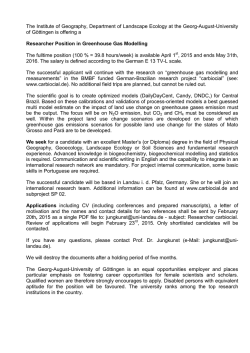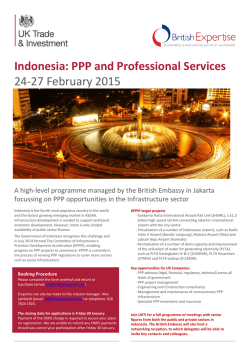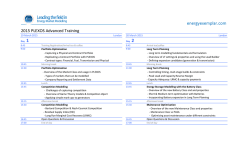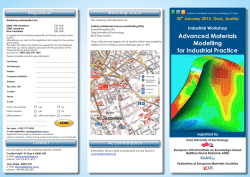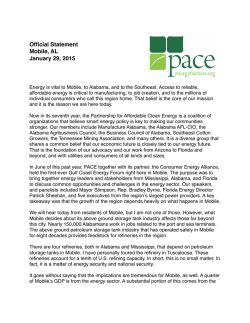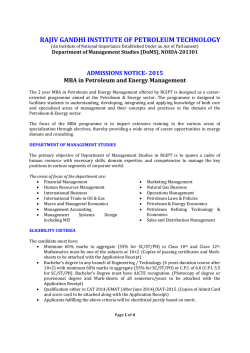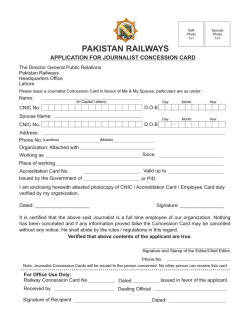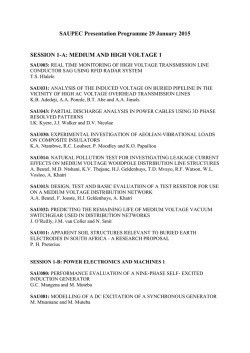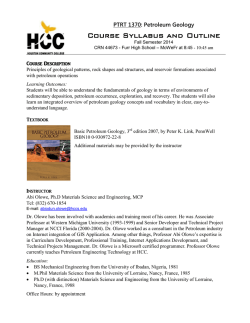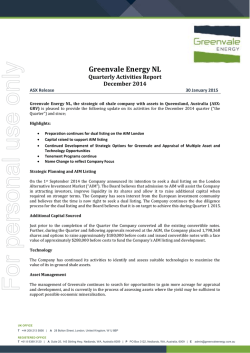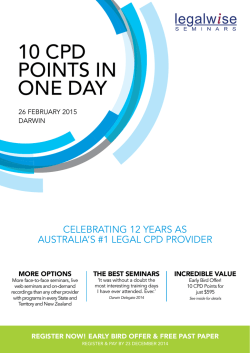
COURSE BROCHURE
kuala lumpur abuja Aberdeen Doha Johannesburg Singapore Hong Kong Dubai New York LONDON Course Brochure Table of contents Background page 3 Oil & Gas Facultypages 5-8 Mining Faculty pageS 9-11 Public Private Partnership FacultypageS 12-16 Our clientspage 17 I. About AME Trade Ltd II. Why AmeTrade Training? Our work: AME Trade Ltd is a UK based organization specializing in the area of trade promotion for the African and Middle Eastern regions including: business to business conferences, trade exhibitions, capacity building and consultancy services. a.We are consultants for the African Business Roundtable and NEPAD Business Group, African Petroleum Producers’ Association as well as various Governments and Ministries across Africa and the Middle East. b. We cooperate with local public and private sector organizations in Europe, America, Middle East and Africa and have a portfolio of international clients which includes some of the world’s leading brand names and bilateral bodies like the World Bank, African Development Bank and Asian Development Bank. c.AME Trade has a passion for not just conferences and trade promotion but for delivering world class training workshops. AmeTrade operates international training locations in London, New York, Dubai, Johannesburg and Kuala Lumpur. Our aims are: • To help build capacity in both private and public sectors in Africa. • To organize practical events that are targeted at niche markets and provide need to know business and practical information. • To assist both local and international corporations with marketing strategies and facilitate their business objectives. • To provide expert support to our local partners and spread the word of their work to the international business community. a) AmeTrade Courses are fully certified by the internationally recognised Continuing Professional Development Certification Service. b) As a CPD Certified course, participants are assured of the highest level of professional education. c) As the CPD is internationally recognized, participants are able to earn credit through this study which some universities now accept as part credit for certain course work. d) CPD logo appearing on the certificates means participants have an internationally recognised certificate e) AmeTrade always guarantees a healthy student to teacher ratio f ) Because the courses are CPD certified means that AmeTrade is bound by a set code of conduct. We are assessed by an independent body of consultants. We are also bound to circulate feedback forms during the trainings which will be submitted to the CPD body for analysis. This ensures that participants are assured of the highest quality of training and also, that AmeTrade is held accountable. 3 TRAININGS in pictures AMETrade Unit 408-409 United House North Road N7 9DP London United Kingdom 4 OIL AND GAS FACULTY OIL & GAS FACULTY a. Master Class in Oil and Gas Course Contents • Petroleum geology - the origin of Hydrocarbons • World Energy demand and supply • Ownership and Exploration of Oil and Gas reserves • Drilling • Field Development • Petroleum Economics • Health, safety and the environment • Petroleum Production and Treatment • Oil Refining • Decommissioning • Local content development • Practical local content • Assessing global capital to promote local content • Challenges and opportunities surrounding local content • Global case studies on local content development and implementation • Future issues and challenges Course Objectives At the End of the Training Course, participants will be able to; 1. Understand the historical and scientific origin of Oil and Gas 2.Understand the world of International Oil and Gas Politics 3. Understand Oil and Gas terminology 4.Appreciate the complete Oil and gas value chain 5.Understand Oil and Gas Contracts and 6.Understand local content issues 7.Have an understanding of growing trends and current challenges in global Oil and Gas 6 OIL & GAS FACULTY B. Oil and Gas Finance Course Contents • • • • • • • • • • • • • • • • • • • • • • • • • • • • • Industry overview/qualitative & Quantitative Risk Analysis: Structure of the International petroleum industry Different risk/reward objectives of sponsors and lenders Structural and Price drivers in oil and gas lending Quantitative risk analysis Country/Political risk Quantitative risk analysis Loan value Upstream oil and gas financing European and North American borrowing bases Structural features of the European borrowing base Recent trends in Oil and Gas Finance Understanding Refinery Finance Refinery operations Cash flow volatility Operational mitigation of volatility Debt structuring to mitigate lender risk Refinery market analysis for lenders Oil and Gas Transmission & Distribution lending Trunk Pipelines and distribution networks Gas storage and distribution finance Liquefied natural gas finance Current trends in LNG debt market LNG liquefaction finance LNG gas finance LNG regas finance LNG ship finance Recent trends Other downstream finance Course Objectives At the End of the Training Course, participants will be able to; 1. Acquire comprehensive knowledge of the key financial management systems used in the sector 2. Acquire ability to effectively manage liquidity risk, credit risk and market risk 3. Understand the mechanics of upstream oil and gas finance 4. Develop the ability to perform effective scenario planning and financial modelling 5. Understand the complexities of refinery finance 6.Understand oil and gas transmission and distribution lending 7. Have a grasp of project finance strategies 8.Understand local content issues 9.Have an understanding of growing trends and current challenges in global Oil and Gas 7 OIL & GAS FACULTY C. Oil and Gas Law for non-lawyers Course Contents • Petroleum contracts and contract negotiation • Context of Petroleum Law • Petroleum legislation • Authorisations • The Commercial contractual matrix • Key legal principles in Oil and gas contract law • Rules of Contract interpretation • Contract negotiation • Production sharing contracts • Best practice, procedures and regulations • Fiscal systems for the oil and gas industry • Royalties • Production sharing • Concessions • Joint venture agreement • Boilerplate provisions e.g. Agreements to agree, Promises to negotiate, Good faith, “Subject to contract” • Service agreements • Administration of fiscal systems • And Standalone Vs. Incremental Analysis • Negotiating for Win/Win outcomes • Dispute resolution in the oil and gas industry Course Objectives At the End of the Training Course, participants will be able to; 1.Acquire a basic understanding of Petroleum Contracts and contract negotiation 2. Understand the key legal principles in oil and has contract law 3. Have an over-view of the various types of oil and gas contracts 4.Get an understanding of contract negotiation 5. Understand royalties and how they fit into the equation 6. Understand the key tools needed for conflict resolution in the oil and gas industry 8 MINING FACULTY A. Understanding the Mining Industry from Start to Finish Course contentS • General Industry Overview • Basic terms and concepts • Introduction to geology, metals and minerals • Ore deposit models • Exploration methods • Project evaluation techniques and methods • Understanding press releases • Understanding investor relations • Mining and Processing methods • Resources and reserve categories and their requirements • Resource estimation techniques • Valuation techniques and hands-on demonstrations for approaching asset models • Listing Process • Equities and investing • Metals markets • Pricing in illiquid markets • Financing methods • Off-take arrangements • Private equity Course Objectives At the End of the Training Course, participants will be able to; 1. Gain a general overview of the Mining Industry across the value chain 2.Understand the basic terms and concepts in Oil and Gas 3. Understand the most common exploration techniques 4.Gain insights into minerals, their occurrence and characteristics 5. Understand how to deal with investors and manage expectations 6.Gain and understanding of the global metals markets 7.Gain an understanding of the listing process 8. Understand the different types of mining 10 B. International Investment law and policy for the extractive industry for Non-lawyers Course contents • Introduction to international Law and policy • Historical background to the current international investment law regime, including the law of diplomatic protection • Sources of International Law • Customary international law of state responsibility for injuries to aliens, forerunner to the current treaty-based investment protection regime • Present the tension between a host’s interest in retaining unfettered sovereignty and an investor’s interest achieving reassurance and predictability about the regulatory environment for the duration of his investment • Political risks investors, particularly in emerging markets • Admission and Establishment – Attractive FDI and Maximizing its benefits • Expropriation • Pathways in existing treaties and international investment law that permit states to regulate human and labour law rights • Local content issues Course Objectives At the End of the Training Course, participants will be able to; 1.Understand the historical background to the current international investment law regime, including the law of diplomatic protection 2. Understand the kinds of political risks investors face, particularly in emerging markets and how investors assess their risks in advance 3. Understand the concept of political risk insurance as an alternative or a supplement to treaty protections and dispute settlement 4.Understand the reasons that states want to attract international investment and factors that make them successful 5. Comprehend the issues a country should consider when deciding whether or not to enter into an investment agreement 6. Distinguish between lawful and unlawful expropriations 7. Discern the appropriate role of the doctrine of “legitimate expectations” in determining whether or not there has been a taking 8. Consider the wisdom of a government’s embarking on a program of privatization of key industries 11 PUBLIC PRIVATE PARTNERSHIP FACULTY A. Introduction to Public Private Partnership Course ContentS • Introduction to Public Private Partnership • Regulatory framework for PPPs • Inceptions and overviews for PPP forms and options • Financial analysis and the need for project appraisals • Project selection for PPPs • Value for money and affordability • Introduction to project finance, project structures and documentation • Consortia and suppliers operations • Key metrics from a funding perspective • Preparation for project management • The contract as regulatory framework • Typical risk allocation • Techniques for risk mitigation • Using key indicators for performance monitoring Course Objectives At the End of the Training Course, participants will be able to; 1.Understand basics of PPPs 2.Understand how to select projects for PPPs 3. Get a basic introduction to financial analysis 4. Decide how to evaluate affordability and value for money 5.Understand the basic elements of a PPP contract 6.Understand the techniques for risk mitigation 7.Understand how to monitor performance 13 B. Project management essentials for PPPs Course contentS • Project management role at pre-inception • Project selection and business case • Projects and project management in PPP • Engaging PPP advisors • Risk Analysis • Project Management role during the procurement process • Overview of the procurement process and role of the PPP project office • Developing best practice check lists • Negotiation preparation, skills development and methods for win-win solutions • Effective communication with stakeholders while managing political risk • Project management role at development, delivering and exit • Monitoring based on Content Vs. Prevailing Legislative and regulatory institutions • Key tasks and reporting requirements for managing and maintaining PPPs • Maintaining essential project data • Conflict resolution • Employee and staff management • Tasks for successful project closure • Institutionalizing project experience and lessons learned Course Objectives At the End of the Training Course, participants will be able to; 1. Understand the reality of and how to manage political risk 2.Develop skills essential for project selection and valuation of business cases 3.Decide when and how to engage PPP advisors 4. Effectively communicate with stakeholders while managing political risk 5.Know the ins and outs of a successful project closure 14 C. The legal tool kit for PPPs Course contentS • Legal agreements for PPP contracts • Review of various contracts • Risk Identification, risk matrix & evaluation and risk mitigation • Government guarantees • Elements of due diligence • Bankability of PPP contracts • Negotiations • Contractual compliance, performance monitoring, enforcement and dispute resolution for PPP projects • Ensuring contracts have effective monitoring and report requirements • Strategies for ensuring compliance • Management of contractual compliance units – structures, capacity development and public relations strategies • Advanced modelling with legal analysis • The role of models and common rules • How bids are assessed • Typical Project structure • The current world market and various case studies • Legal due diligence, documentation and structuring • The assumption page • The risk Matrix • Operations • Construction • Insurance • Taxes • Strategies for dealing with performance failure, disputes for termination events • Determining when to incorporate a contract renegotiations • Why renegotiating may be a win-win strategy • Strategies for effective contract renegotiations • Strategies to incorporate dispute resolution and arbitration procedures • Managing dispute processes • International arbitration processes 15 D. Advanced Project finance and financial modelling techniques for PPPs Course contents • • • • • • • • • • • • • • • • • • • • • • • • • • • • Current trends in the market place and financial modelling strategies International capital market development and long term financing instruments Sub-sovereign projects and municipal credit ratings Analysing the intricacies of debt/equity structuring Forecasting demands for service delivery in various sectors Financial Modelling Strategies Defining and translating financial model’s objectives into outcomes Financial model formats and uses The structure and design options of project finance models and techniques to get appropriate data Data organisation and worksheet model Testing and correcting the model Performing pro-forma financial projections Spreadsheet modelling for project finance projections Understanding spreadsheet functions to analyse key relationships within the model Using menu-driven regressive tools Sensitivity analysis planning for project pricing Financial sources to renegotiating of concessions and project financing agreements Multilateral development banks: equity/debt Export credit agencies: debt Bilateral investment agency funds Sub ordinate debt sources and pricing Political risk insurance Understanding the requirements for concession renegotiation and revision Preparing for renegotiation and revision Preparing for renegotiation as an expected phase of the project finance life cycle Financial modelling techniques for concession renegotiations Understanding “stand still” clauses in concession contracts Negotiation strategies for concession renegotiations and project refinancing Course Objectives At the End of the Training Course, participants will be able to; 1. 2. 3. 4. Get up to date information on trends in the market place and financial modelling strategies Understand capital market development and long term financing instruments Understand current financial modelling strategies Understand the structure and design options of project finance models and techniques to get appropriate data 5.Understand data organisation and worksheet model 6. Demonstrate ability to perform pro-forma financial projections 7.Get an understanding of sub-sovereign projects and municipal credit ratings 8. Understand valuation modelling in project finance 9.Acquire an understanding of the menu-driven regressive tools 16 Some of our clients include CONTACTS US Training and Consultancy Department Tel: +44 207 700 4949 Dir: +44 207 697 1065 Fax: +44 207 681 3120 Email: [email protected] Web: www.ametrade.org AMETrade Unit 408-409 United House North Road N7 9DP London United Kingdom
© Copyright 2026

